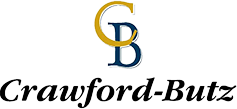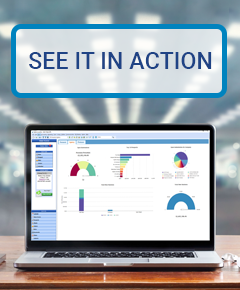
Agency Information
- Based in St. Louis, MO
- Founded in 1961
- 70% Personal, 30% Commercial
- 25 Employees

Kevin Butz
“(The Partner Platform system) is evolving to meet our needs, (so) why would we go somewhere else? It’s like we get a better system each update. There’s a huge downfall in a system that’s not willing to change. I like to position us with software that’s evolving and people that are innovators. That’s the Partner Platform team.”
Kevin Butz is a “third-generation insurance man” focused on making his family-owned agency grow so there can be fourth, fifth, and more generations in the family business. Crawford & Butz has been in operation since 1960, constantly growing and even surviving the COVID-19 pandemic in 2020. We talked to Kevin about his growth mindset, how his agency uses technology to foster connections, and why data is a big part of what helps Crawford & Butz succeed.
Tell us about your agency – your history and what separates you from other independent agencies.
My grandpa and his business partner started the agency back in 1961, and I’m a “third-generation insurance man,” as my grandmother-in-law likes to say. Though my grandpa’s partner passed away before the agency got off the ground, we kept the “Crawford” of Crawford & Butz out of respect.
My dad and uncle joined in the 80s, and we’ve been on a growth trajectory ever since. We were a bit of a one-man-shop before they joined, but adding those agents spurred growth. We added more agents throughout the 80s and 90s, many of whom still work with us today. More of us joined in the 2000s, and now we’re starting to develop the next generation to keep the business growing.
We’re family-owned, and that makes us stand out in the larger industry, but within the independent, family-owned space, we stand out with our growth focus. We’re driven to improve sales, develop talent, and leverage technology. Our philosophy – similar to Partner Platform and SIS – is “what can we do better today than we did yesterday?”. That forward-thinking drive to improve makes us unique.
How do you think about technology in your agency? How does it fit with your family-operated, personalized approach?
We understand that marketing is changing, and the way people communicate is changing, too. We can’t rely on the methods we used in the 60s – the world just isn’t the same. You used to sit in someone’s kitchen to write every policy, but now we have some clients we’ve never met face to face. Everything moves so much faster, and we need to do more than keep up; we need to stay ahead to stay relevant to our growing client base. We use technology to help us do that.
At the same time, we still answer calls, emails, and texts personally, responding to every question thoroughly. You can make money in insurance and not like people, but then it’s just a grind. We like people here – that’s the culture we created and continue to foster. We’re not tech adverse. We leverage technology to make things work better and faster, so we can take the time to slow down for our customers when they need us.
You’ve been with Partner Platform since it was part of State Auto. What is it about the system and the SIS team that keeps that partnership going?
We’ve never had another management system provider apart from SIS. When we started with SEMCI, it was to help us manage the wealth of information coming at us. The volume of paper forms was overwhelming and impossible to track and store. We wasted so much time looking up information in paper files and needed a streamlined management system solution to get us out of that pile.
The question then is why we stayed. As part of my job, I vet all the operational changes we implement, and I appreciate that Partner Platform recognizes the need to grow. The team at Partner Platform knows the system is a work in progress, with the core functions optimized and room to expand as technology and agency needs change.
Especially in the past few years, you developed some incredibly relevant add-ons, from the mobile app to the client portal and others. And if your platform is evolving to meet our needs, why would we go somewhere else? It’s like we get a better system each update. There’s a huge downfall in a system that’s not willing to change.
I like to position us with software that’s evolving and people that are innovators. That’s the Partner Platform team.
What do you and your team expect from your agency management system? What are the features you can’t live without?
One that we didn’t know how badly we needed at the time is virtual hosting. Before COVID hit, we finished implementing a planned transition to virtual to make things more accessible for our staff. Little did we know what a huge impact it would have on our operations. Once the stay-at-home orders hit, we were fortunate to have all our staff up and running the next working day. That was a real game-changer.
Partner Platform’s marketing automation manager is another great piece of tech. We got on board with it pretty quickly after it was released, and that was incredibly helpful during the beginning of the pandemic. We were able to mass-communicate with our book, sending out information on what we were doing, how to contact us and just some kind words – and we did so efficiently thanks to the marketing automation manager.
When it comes to Partner Platform adding new features, you and your agency are early adopters – why is that?
It’s because each of the add-ons are no-brainer decisions. Whether it’s the integrated text messaging, the marketing automation manager, or the app, they each filled a need that was right there. They’re all sensible, practical updates, and the price is so competitive that there’s no reason we wouldn’t get on board.
What are some of the most notables add-ons and enhancements you’ve seen over the years?
As I said, the marketing automation manager is a brilliant piece of technology. It serves so many different functions. We have a very seasoned book of business, including some clients we wrote initially in the 60s, so we have a lot of data that would take forever to segment manually. With the marketing automation manager, we can reduce that book to segments and communicate specific information to each group. We can break out clients from way back – ones we had for 20 or 30 years – and have conversations about liability limits or adding an umbrella – things that didn’t exist when we signed them.
For example, over the last ten years car prices increased dramatically, and those cost increases left many of our clients with some exposure. With the marketing automation manager, we were able to communicate that exposure to them very efficiently. We told them what we can do and what they should consider, and we did that for hundreds of people at a time instead of individually finding all of those little gaps. We get a lot of responses back from those marketing campaigns.
From that perspective, the marketing automation manager helps us serve our clients more efficiently, and it protects us from errors and omissions. Since marketing manager messages are documented in Partner Platform, we can easily show that we contacted each vulnerable client about increasing coverage.
How has your partnership with the Partner Platform and SIS team evolved over the years? How have they helped you reach your goals as an agency?
As a member of the Partner Community Board, I get to see things when they’re in development, and that’s pretty powerful. We get a chance to give input while something is in process rather than after it’s already done. We take advantage of that, to help ourselves and all the Partner Platform agencies. With that “pre-release” status, our relationship with SIS puts us just a little bit ahead of where our competitors might be since they’re not getting the inside scoop from their provider.
How do you see the industry changing in the next five to ten years? How do you see Partner Platform supporting you through those changes?
This is something we think about often. Virtual will become more prominent, and I see data as having a much more significant influence. With data, the way the Partner Platform functions just from a data storage view will help. Every email is saved in a client’s file, giving an accurate a picture of that account’s evolution. And, for us, data mining and selling to a data set is interesting. It uses a whole different part of your brain than writing policies. It allows us to use our analytical skills – it’s exciting and interesting to switch things up like that.
With the virtual clients, as things come up like coverage changes and suggestions and happy touches, the marketing automation manager and texting systems will only help us. Obviously, a healthy management system can only help, too, because if all the leads, quotes, and policies are coming in virtually, we’ll need to track all of that communication accurately. Partner Platform is set up for that.
What advice would you offer to agencies looking for a new management system experience?
If you’re just getting an agency off the ground and you’re not taking a whole lot of service phone calls, you need a system that can help you with rapid growth. Though I can’t speak to that personally, logically, you would want to find a management system with built-in campaign marketing capabilities and virtual marketing. Partner Platform’s got you covered there with the marketing automation manager.
If you’re a service-oriented agency –a large part of what we do – a healthy, robust way of data mining your books is paramount. If you look at a book of 10,000 or 100,000 clients, it’s daunting. If you’re looking for a specific aspect of the book and can’t efficiently reduce it to the 2,000 or so you need, then don’t go with that system.
One of Partner Platform’s strengths is that it’s easy to reduce a macro-level data set to a micro level, actionable data set. When you do that, you can communicate more effectively and write more business. Anybody who’s looking for a management system needs to be able to manipulate their data. We can get a detailed data set– like people who have “x” bodily injury limit that don’t have a home that and don’t have an umbrella – something like that with a three-tiered data set, and we can mine that out. That makes a significant difference in how we market and grow coverage.

